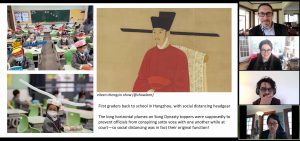Laura Haley
Chief Copy Editor
On April 28, the Global and International Studies (G&IS) department hosted a roundtable discussion titled “Contextualizing Pandemic” via Zoom for current and admitted students from the class of 2024. The meeting featured G&IS professors, Matthew Krain of the political science department, Amyaz Moledina of economics and Margaret Ng and Christina Welsch from the history department and was hosted by Dean of Admissions Jennifer Winge. The panel was intended to help produce a better understanding of the current pandemic through historical, political and economic perspectives via the professors’ presentations and accompanying slides. The topics discussed ranged from human rights concerns to the U.S economic state and strains on global organizations. Each professor led a brief presentation related to their field of study and how it is tied to COVID-19.
To begin the roundtable, Welsch discussed epidemics that spread throughout the British empire in the Indian Ocean in the 19th century and their relation to larger societal issues. She mentioned that “responses to pandemics are not equal and they reflect societies in which those responses are made.”

From there, Krain highlighted the rhetoric of the current pandemic and how the words used to discuss and respond to COVID-19 are tied to issues of human rights, stating, “sometimes that language [of securitization] gives countries or leaders an opportunity to do things that otherwise wouldn’t be acceptable during peacetime.” For example, he highlighted the recent centralization of power by Prime Minister of Hungary Viktor Orban, under the guise of a response to the threat of the virus. Krain explained that global leaders may be inclined to frame pandemics as a security threat as a justification for authoritarian accumulation of power.
Ng then discussed prior epidemics and history in China, including the 1910 Manchurian plague and the 2003 SARS epidemic in order to contextualize the current situation. She compared these epidemics with COVID-19 and the responses to them, especially after 2003 with the emergence of the Chinese Center for Disease Control and Prevention. She also showed pictures of the social distancing measures being taken by children in China today, and compared them to historical methods of maintaining social distance, such as attaching sticks or planks to the head to make sure that others stay a certain distance away. In the current example, children are attaching long balloons to their heads, as well as wearing masks, to protect their health and others.
To wrap up the panel, Moledina focused on COVID-19 and the economy, specifically by highlighting that those who experience financial distress live in areas with a disproportionately high number of cases and fatalities from the virus. He mentioned that, although “COVID-19 is a public health crisis, not an economic crisis … there is no economy without people.” In conclusion, he stated, “Our economy today really relies on connections and the way we combat this disease, in the absence of a cure, is actually disconnection.”
The panel concluded with a few questions from those watching virtually. Regarding a question about how COVID-19 will impact our global organizations as countries begin to open at different rates, Welsch stated, “We think of the 21st century as a period of increased globalization and increased movement, but there’s another story where it’s a period of decreased movement, of the creation of boundaries and borders through immigration restrictions and passport controls.”
A final question was asked: “do we anticipate similar measures [to China] being implemented in schools in the U.S?” Ng responded, “I think the College has been working very hard to think through some of these possible measures. But one thing that I think we might see becoming the norm will be what has been the norm in most East and Southeast Asian countries which is the wearing of face masks; not because they are sick, but out of courtesy so that they do not infect other people. I think that will become the norm in North America for at least the next year or two.”
Concluding the panel, each professor welcomed those with questions, especially admitted and undeclared students, to share them via email.
